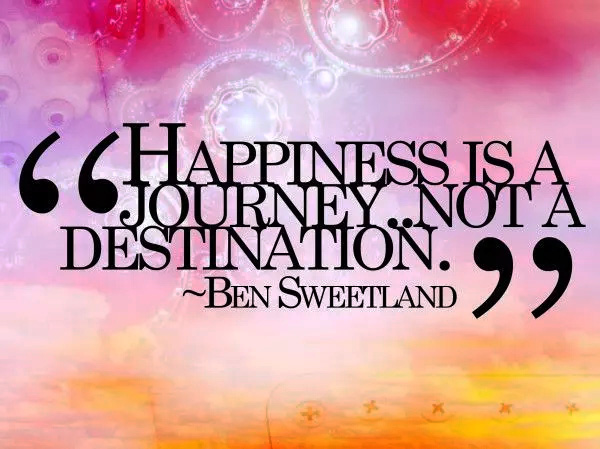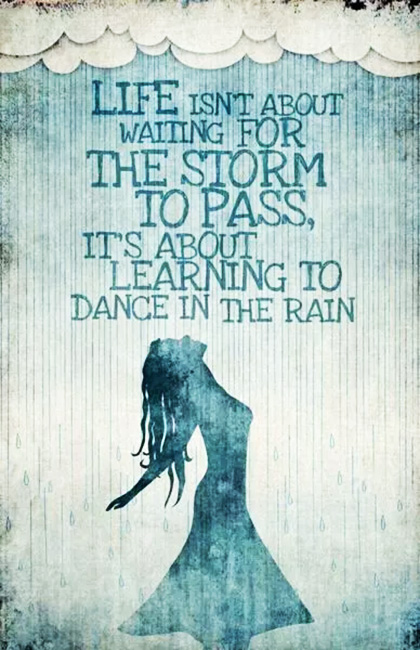|

by Gary 'Z' McGee
October
03, 2018
from
FractalEnlightenment Website

"A sense
of meaningfulness
is healthier
than happiness.
Mere happiness
is associated
with selfish
'taking' behavior,
while having a
sense of meaning in life
is associated
with
selfless
'giving' behavior."
Rob Brezsny
There's nothing wrong with wanting to be happy. We all want to be
happy...
But maybe happiness
should be looked at in the same way we look at enlightenment:
where the journey is
the thing...!
I mean,
What if happiness
never shows up?
What then?
Do we wallow in our
sadness, pitying ourselves, or do we inject meaning into our
experience no matter how sad or tragic it may be?
Maybe it is in the
seeking for happiness itself that prevents us from ever achieving
it.
Maybe our expecting to be
happy, or believing that we "deserve" to be happy, has us clinging
so tightly to its fulfillment that we're smothering it before it
ever has a chance to spark.
Like a carrot forever
dangling out of our reach...

Maybe it's our incessant seeking of happiness that has the cart
wedged in front of the horse, and maybe discovering meaning in the
moment is putting the horse back in front of the cart so that we can
at least continue our journey - whether happiness decides to show up
or not.
Or, maybe happiness is a choice. Maybe it's always been there and
all we had to do was tap into it.
As Dan Millman
said,
"There is no path to
Happiness. Happiness is the path."
But the question is this:
how do we achieve a
state of mind where we can utilize a healthy disposition?
Because when it comes
down to it, it's really just a matter of perspective. It comes down
to how capable we are of discovering meaning within our journey.
I would even argue that the more meaning we're able to discover in
our life's journey, no matter how tragic, dramatic, or even comedic
the journey may be, the more likely we are to be authentically
happy.
Stumbling over
happiness
"The
premise of the Takers' story is
'The world
belongs to man.'
…The premise of
the Leavers' story is
'Man belongs to
the world'."
Daniel Quinn
Ishmael
Here's the thing, with constantly seeking happiness:
there's the tendency
to shirk responsibility for our own emotional state, to imagine
that happiness is 'out there' somewhere, or that happiness is
dependent upon people acting a certain way.
But when we're under the
spell of this unhealthy perception, we're inadvertently in a state
of disempowerment.
We're not truly in the moment, we're not fully aware of reality the
way it is, because we're too busy wishing that something-or-other
were the case, or that someone "should have" treated us better.
But we cannot control
other people. We cannot control fate.
We can only control
the way we react...
When we're in the frame
of mind that we "deserve" to be happy, we're in a state of
disempowerment, because we're allowing fate or other people to
decide our emotional state for us.
Like Abraham Hicks said,
"Tell everyone you
know: 'My happiness depends on me, so you're off the hook'."

And then demonstrate it.
Be happy, no matter
what they're doing.
Practice feeling
good, no matter what.
And before you know it,
you will not give anyone else responsibility for the way you feel -
and then, you'll love them all.
Because the only reason you don't love them, is because you're using
them as your excuse to not feel good.
There is also the tendency to take more than we need, because we're
vainly trying to fill a void that cannot be filled. We believe our
emptiness needs to be filled before it has even been reconciled,
which leads to the idea that the world owes us something, or that
the world "belongs" to us.
We consume any number of things in order to "gain" or even "take"
happiness, only to realize in the end that no amount of
overindulgence, hyper-consumption, material possessions, or money
could ever make us happy.
When we seek happiness "out there" instead of being present with
happiness "in here," then we're more likely to fall prey to slippery
con artists or charlatan middlemen pedaling happiness like it was
snake-oil.
This is especially the case in hyperreal cultures with
manipulative commercials and devious advertisements
seeking to capitalize on our need to be happy:
"You'll be happy with
this fancy new gadget!" or "Make your friends green with envy
with this brand new car! Act now!"
But
happiness is not a commodity.
The "good life" is not
attained through the "goods life."
Meaning:
happiness is not
found but created, here and now, in the present moment...
Discovering
meaning
"Happiness is the absence
of striving for
happiness."
Chuang Tzu

In order to discover true
happiness in this life, one must become adept at adapting.
By
living in the moment, with the
ability to
let go of the past and not dwell on
the future, we're more likely to be able to adapt to any condition.
Whether life brings
us pain or pleasure, sorrow or joy, tragedy or comedy, the
ability to adapt is the ability to engineer meaning into an
otherwise meaningless universe...
It's getting our "need
for happiness" out of the way so that we can enjoy the journey for
what it is, whether it brings us happiness or not.
When we make the search for meaning primary and the search for
happiness secondary, we begin living life on purpose, with purpose,
and happiness becomes a side effect of our journey instead of the
reason for it.
Because happiness may never come.
We might not ever be
able to achieve a perfect, happy life, and it shouldn't matter
as long as we're living with purpose and taking responsibility
for the meaning we bring to any given situation.
When we allow the journey
to be the thing, we're in the moment, in the throes of the journey,
and life becomes meaningful despite it being difficult or easy,
painful or pleasurable, sad or happy.
The journey is our
cake.
Being happy is the
icing on that cake.
But if we can get to the
point to where we can enjoy our cake with or without icing, then we
can begin eating our cake with purpose, without an icing (happiness)
agenda, and we're better able to appreciate the icing (happiness)
when we are lucky enough to get it.
If, as
Thucydides said,
"The Secret of
happiness is freedom, and the secret of freedom,
courage",
...then it behooves us,
to have the courage
to discover meaning despite happiness, because the need for
happiness itself can be a kind of prison that we must free
ourselves from...
So I would add that
the secret of
authentic happiness is freedom, to include
especially freedom from the need for happiness...
This way we are free to
bring meaning to any given situation without any agenda other than
authentic intention in the moment, where our self-created meaning
becomes the cornerstone whereupon our potential happiness can be
leveraged.
But the happiness is always only potential happiness and secondary
to the primary experience of discovering meaning in the
moment, which can become authentic happiness...
|





